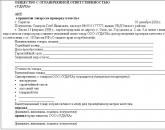Imposing a disciplinary sanction
The employee and the employer are bound by an employment contract, to fulfill the terms of which both parties are obliged in good faith. If an employee does not fulfill his obligations, the approved routine is a disciplinary offense. The employee is held accountable. Website resource consultants will tell you in detail what the procedure for imposing a disciplinary sanction is. Sometimes an employee messes up so much that it comes to termination of the employment contract.
What are punishable offences?
An employee is punished if he intentionally violated the rules of conduct contained in the labor agreement, collective agreement and administrative acts of the organization. Deviations from official rules can be expressed in the following:
- Absence from work or unauthorized absence without good reason (truancy).
- Groundless disregard for official duties.
- Uncoordinated exit to the next vacation.
- Being at work under the influence of alcohol or drugs.
- Unauthorized distribution of confidential information.
The severity of the offense depends on the punishment. If objective circumstances prevented an employee from performing work (lack of necessary building materials or equipment, traffic accidents, government restrictions, illness), his guilt is excluded.
What are the types of disciplinary sanctions?
Art. 192 of the Labor Code of the Russian Federation contains a list of penalties:
Comment. It is considered a mild form of punishment. It expresses a censure of the employer and is imposed for minor deviations from the rules. The note is more of a warning.
Rebuke. This measure is applied in cases where the misconduct is classified as a serious violation of labor rules.
Dismissal with reference to the relevant article of the Labor Code. The most severe type of penalty is resorted to if the employee has committed gross violations of official duties and discipline: appearing in a state of intoxication, embezzlement of entrusted property, or has previously been subject to disciplinary liability.

Measures of punishment in the form of deprivation of bonuses, demotion or a fine do not apply to disciplinary sanctions and are not subject to application.
The specificity of certain categories of employees may provide for other types of punishment. For example, deprivation of a badge, demotion in rank are applicable to military personnel. Prosecutors can be severely reprimanded.
For one misconduct, the employee is brought to one type of liability. In this case, it is not necessary to follow the sequence set forth in Article 192 of the Labor Code of the Russian Federation. The penalty depends on the severity of the particular offense and its consequences. In order to avoid conflicts with the employer, you, as an employee, must know everything about the contractual regulation of labor relations.
What are the rules for imposing disciplinary sanctions?
The procedure for bringing to disciplinary responsibility consists of the following steps:
1. Fixing a violation
At this stage, it is required to document the misconduct of the employee by drawing up an act on the identification of an illegal act and submitting a memorandum to the management.
If the misconduct is committed by absenteeism at work at the appointed time, the personnel officer or other person whose functions include monitoring the performance of official duties by employees prepares an appropriate act. It is advisable to involve two witnesses in this, who will certify with their signatures the validity of the failure to appear. In addition, personnel personnel makes an appropriate mark in the report card.
The management of the enterprise is informed about the incident, which, depending on the specific misconduct, appoints an internal investigation.
2. Requesting explanations from the guilty person
The employer offers the employee to prove the validity of the reasons for the misconduct by sending him a written request. If the employee does not mind providing an explanation, you can limit yourself to an oral demand.
An explanatory note is drawn up in any form and sent to the employer within two days. If necessary, supporting documentation is attached to it.
If the offending person does not provide the document within the specified period, the responsible person of the employer draws up an act of refusal to provide explanations.
3. Internal investigation
The Labor Code does not contain the term “official investigation”, but for the purpose of a comprehensive and objective consideration of the case, organizations practice conducting it.
To do this, by order of the employer, a special commission is formed, which includes representatives of the personnel service, the security department and internal audit.
Members of the commission collect evidence, interview eyewitnesses, conduct examinations, in a word, clarify all the circumstances and reasons for the misconduct.
The results of the consideration of the special commission are drawn up in the form of a conclusion, which gives a legal assessment of what happened, recommendations on the type of disciplinary sanction for the employee.

If during the internal investigation it turns out that the employee’s actions show signs of a criminal act, the manager is asked to transfer the material to law enforcement agencies or the prosecutor’s office.
Based on the act of misconduct, an explanatory note and the conclusion of a special commission, a written order is drawn up on the application of a disciplinary measure to the offender.
The order to impose a disciplinary sanction includes a description of: the full name and position of the employee, the circumstances of the misconduct, the violated acts of the organization, the guilt of the employee and the type of punishment chosen.
The act of the employer within 3 days is handed over to the guilty person against signature. If it is not possible to familiarize him personally, the personnel officer sends the document by registered mail to the place of residence.
The order to impose a disciplinary sanction may be appealed by the employee to the state inspectorate, the commission on labor disputes and the court.
What are the time limits for disciplinary proceedings?
The terms for imposing a disciplinary sanction are regulated by Article 193 of the Labor Code. An employee can be punished if one month has not passed since the day the direct supervisor of the guilty person became aware of the misconduct. This period does not include time spent on vacation and sick leave.
It is impossible to apply a penalty after six months from the day the illegal act was committed. This period is extended to two years in case of detection of illegal actions based on the results of a financial audit or audit. It does not include time spent on criminal proceedings.
What are the consequences of a disciplinary order?
The existing punishment does not entitle the employee to receive bonuses and other incentive payments for one year. It serves as an aggravating circumstance in case of repeated misconduct within this period and leads to dismissal.
When is the punishment removed?
The disciplinary sanction is valid for one year. After this period, the employee is considered not to have been punished. The penalty may be withdrawn early under certain conditions: at the request of the employer, at the request of the employee, or on the basis of the presentation of the immediate supervisor of the employee.
The employer, having made sure that the punishment has had its effect and the employee is characterized positively at the place of work, has the right to cancel the penalty by order.
An employee, having achieved excellent performance indicators, having prevented repeated misconduct, can apply in writing to the management of the enterprise to remove the punishment.
The person in whose direct subordination the offender is, having ascertained the improvement in the quality and discipline of the work of the latter, has the right to petition the head of the organization to cancel the penalty.
Summing up
The imposition of a disciplinary sanction is the right of the employer, which is granted to him by the labor law to build the normal life of the enterprise and ensure personnel discipline. But the procedure for applying punishment is subject to certain rules, the correctness and timeliness of which depends on the legality of the penalty. Otherwise, the administrative act is canceled, and an administrative fine is imposed on the head.
Popular
- How to get a TIN: possible ways
- What kind of business can you do?
- Written notice of termination of the lease
- Business from scratch. Things to do?
- Cost of goods sold: formula, methodology and calculation example
- How to write a vacation application - examples
- What kind of business can be opened in a small town or village?
- The formula for calculating the cost of services, products sold and total cost
- Sample memorandum: I bring to your attention
- Example of an explanatory note for being late for work





